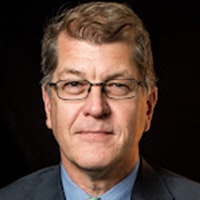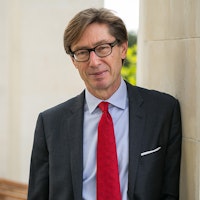
There is now a fight for the international order and a struggle between democracy and autocracy. And we have to be really clear about what side we're on.
Show Notes
President Trump will meet with Russian President Vladimir Putin Monday during a time when international relations are being tested. On the heels of a tension-filled NATO summit, Russia experts wonder whether Trump’s meeting with Putin will address the Russian government’s rising belligerence. Putin’s government is increasingly acting as an outlaw state across the international stage — undermining European democracies, launching devastating ransomware cyberattacks, harassing US diplomats, executing journalists and dissidents, harboring sophisticated cybercriminals, and testing Western alliances. How should the United States, Europe, and the West as a whole respond? The Atlantic’s Steve Clemons leads a discussion with Peter Wittig, former German ambassador to the United States; Kori Schake, deputy director general of the International Institute for Strategic Studies at the Hoover Institution; Andrew Weiss, former director of the RAND Corporation’s Center for Russia and Eurasia; and Evelyn Farkas, national security analyst for MSNBC.
Speakers
-
 Evelyn FarkasNonresident Senior Fellow, Atlantic Council; President, Farkas Global...
Evelyn FarkasNonresident Senior Fellow, Atlantic Council; President, Farkas Global... -
 Steve ClemonsEditor in Chief, AtlanticLIVE; Washington Editor at Large, The Atlanti...
Steve ClemonsEditor in Chief, AtlanticLIVE; Washington Editor at Large, The Atlanti... -
 Peter WittigAmbassador to the United States, Embassy of the Republic of Germany
Peter WittigAmbassador to the United States, Embassy of the Republic of Germany -
 Kori SchakeDefense policy expert at AEI
Kori SchakeDefense policy expert at AEI -
 Andrew WeissVice President for Studies, Russia and Eurasia Program, Carnegie Endow...
Andrew WeissVice President for Studies, Russia and Eurasia Program, Carnegie Endow...
Explore
Related episodes


FBI Director Christopher Wray on Russian interference in the last election.


Kirstjen Nielsen on Trump, Russia, and illegal immigration.


Vladimir Putin continues to taunt the US and Europe at every turn by testing NATO’s resolve, propping up Assad, provoking Ukraine, and even doing what he can to further complicate the migrant crisis. Domestically, Russia’s involvement in hacking the Democratic National Convention is in question.


Nicholas Burns and Strobe Talbott discuss Russia and Putinism.


In a rare interview, the director of the Central Intelligence Agency weighs in on the global security scene and explains the current risks to the United States. John Brennan is interviewed by Dina Temple-Raston, counterterrorism correspondent for NPR, at the Aspen Security Forum.






